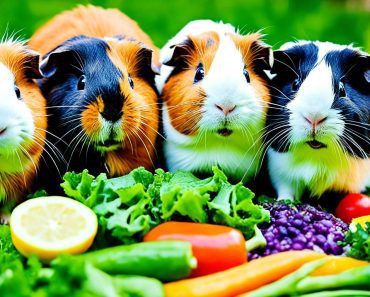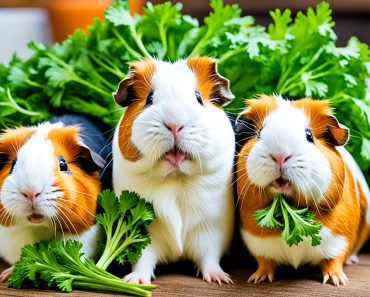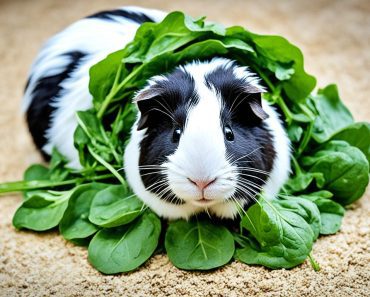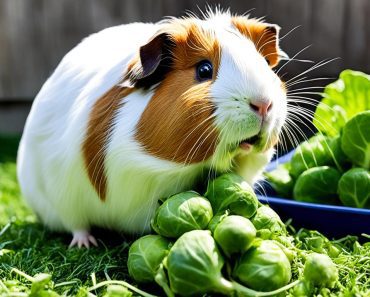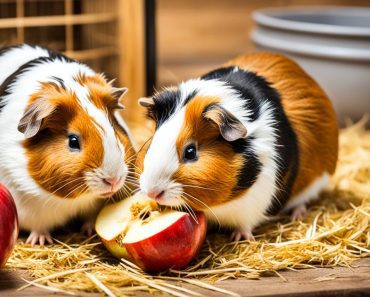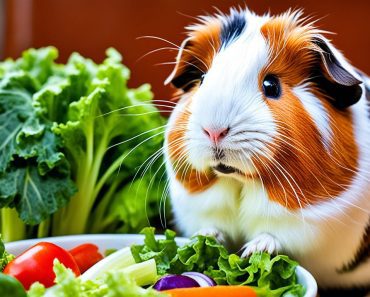Hi there! If you’re wondering whether guinea pigs can eat peaches, you’ve come to the right place. As a guinea pig owner myself, I’ve done some research to provide you with safe feeding tips regarding peaches for your furry friend.
Peaches can be a tasty treat for guinea pigs, but it’s important to understand how to introduce them into their diet and the potential risks involved. Let’s dive in!
Can Guinea Pigs Eat Peaches? Yes, in moderation, they can.
- Guinea pigs can eat peaches as an occasional treat.
- Peaches are rich in vitamin C, potassium, and phosphorus, which are beneficial for guinea pig health.
- Peaches should be given in moderation due to their high sugar content and acidity.
- Introduce peaches slowly into a guinea pig’s diet and monitor their reaction.
- Remember to provide a balanced diet consisting primarily of hay, vegetables, and pellets, with fruits as a small portion of their overall diet.
The Nutritional Benefits of Peaches for Guinea Pigs
Peaches are not only delicious, but they also offer a range of nutritional benefits for guinea pigs. These furry friends can enjoy the sweet taste of peaches while reaping the rewards of essential vitamins and minerals.
Here are some key nutritional benefits of peaches for guinea pigs:
- Vitamin C: Peaches are a fantastic source of vitamin C, which is crucial for guinea pigs. Vitamin C supports their immune system, aids in wound healing, and promotes overall well-being.
- Potassium: Potassium is essential for proper nerve function and helps remove waste from cells. Guinea pigs need potassium to maintain their overall health and vitality.
- Phosphorus: Peaches contain phosphorus, which plays a vital role in bone and teeth formation, as well as tissue repair. This mineral is necessary for guinea pigs to maintain strong and healthy bones.
- Antioxidants: Peaches are rich in antioxidants, which help protect guinea pig cells from free radical damage. These antioxidants contribute to their overall well-being and can even aid in combating certain diseases, such as cancer.
- Hydration: Peaches are water-rich fruits that can contribute to keeping guinea pigs hydrated. Proper hydration is essential for their overall health and helps maintain optimal bodily functions.
Furthermore, peaches are low in calcium and phosphorus, which is beneficial for guinea pigs. This reduces the risk of bladder and kidney stone formation, which can be a concern in their diet.
Downsides and Risks of Feeding Peaches to Guinea Pigs
While peaches can be a tasty treat for guinea pigs, there are some downsides and risks to consider before including them in your pet’s diet. One of the main concerns is the high sugar content of peaches, which can cause digestive issues if consumed in excess. It is essential to feed peaches in moderation to ensure your guinea pig’s overall health and well-being.
In addition to their high sugar content, peaches are acidic and can potentially lead to mouth sores in guinea pigs. These mouth sores can be uncomfortable and impact your pet’s ability to eat and drink. It’s crucial to monitor your furry friend for any adverse reactions after feeding them peaches.
“One downside of peaches is their high sugar content, which can cause digestive issues if consumed in excess. Peaches are also acidic and can lead to mouth sores in guinea pigs.”
If you notice that your guinea pig develops diarrhea, mouth sores, or any other health issues after consuming peaches, it’s best to discontinue feeding them this fruit. Every guinea pig is unique, and some may have more sensitive stomachs or be more prone to mouth sores than others.
Remember, variety is key when it comes to your guinea pig’s diet. While peaches can be an occasional treat, they should not be the sole source of nutrition. A balanced diet consisting of hay, vegetables, and pellets is crucial for your pet’s overall health.
Now that you’re aware of the downsides and risks associated with feeding peaches to guinea pigs, you can make an informed decision about including this fruit in their diet.
| Downsides and Risks of Feeding Peaches to Guinea Pigs |
|---|
|
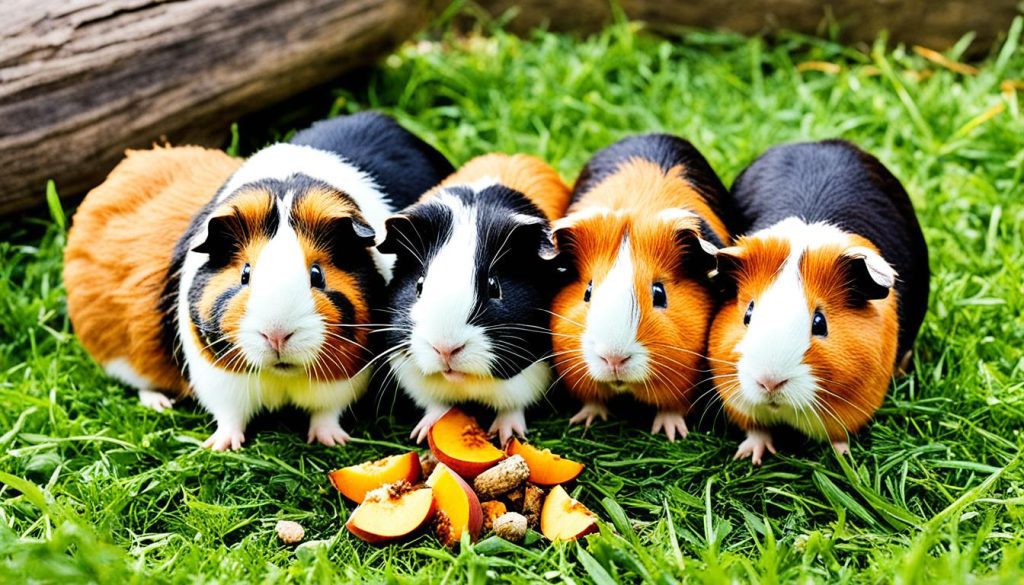
Introducing Peaches to a Guinea Pig’s Diet
When it comes to introducing peaches to your guinea pig’s diet, it’s important to proceed with caution and monitor their response. Start by offering a small amount of peach, enough for a mouthful, and observe any changes in their digestive system or overall health.
If your guinea pig shows no adverse effects after consuming peaches, you can gradually increase the amount over time. However, it’s essential to remember that peaches should be given as a treat and not as a staple food in your guinea pig’s diet.
As you begin incorporating peaches into their diet, it’s crucial to maintain a balanced approach and provide a variety of other fruits and vegetables as well. Remember, moderation is key to maintaining a healthy and well-rounded guinea pig diet.
Recommended Feeding Schedule
- Start with a small amount of peach to gauge their reaction
- If there are no adverse effects, gradually increase the amount
- Offer one or two one-inch wedges of peach once or twice a week
“Remember, peaches should be given as a treat and not as a staple food in a guinea pig’s diet.”
By following this approach and closely monitoring your guinea pig’s response, you can safely introduce peaches into their diet and provide them with a tasty and nutritious treat.
Other Safe Fruits for Guinea Pigs
While peaches can be given as a treat, there are other fruits that are also safe for guinea pigs to consume. It’s important to offer these fruits in moderation and ensure they make up only a small portion of a guinea pig’s overall diet.
- Apples (without skin)
- Bananas
- Blackberries
- Blueberries
- Cantaloupe melon
- Cranberries
- Grapes (red and green)
- Guava
- Honeydew melon
- Kiwi
- Oranges
- Pineapple
- Plums
- Raspberries
- Strawberries
- Watermelon
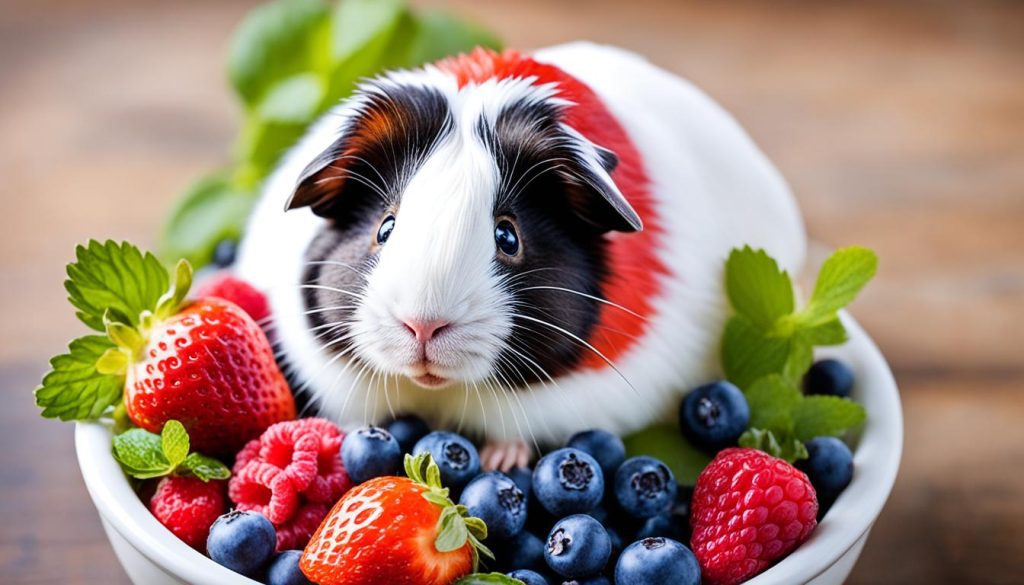
The Importance of a Balanced Diet for Guinea Pigs
A balanced diet is crucial for the overall health and well-being of guinea pigs. While it’s tempting to indulge them with tasty treats like peaches, it’s important to remember that the majority of their diet should consist of hay, vegetables, and pellets. These provide essential nutrients, fiber, and dental wear that are vital for their overall health.
Fruits, including peaches, should only make up a small percentage of a guinea pig’s diet. Feeding them too many fruits, even ones that are generally considered safe, can lead to health issues such as obesity or digestive problems. It’s important to maintain the balance and ensure that guinea pigs receive a variety of fruits and vegetables to ensure they receive a wide range of essential nutrients.
“A balanced diet ensures that guinea pigs receive all the necessary vitamins, minerals, and fiber they need to thrive.”
Guinea pigs are herbivores and have unique dietary requirements. Here’s a breakdown of what their balanced diet should ideally look like:
| Dietary Component | Percentage |
|---|---|
| Hay | 70-80% |
| Vegetables | 15-20% |
| Pellets | 5-10% |
| Fruits (including peaches) | Up to 5% |
Note: Adjustments may be necessary based on individual guinea pig needs. Consult with a veterinarian for personalized dietary advice.
Hay is the most important component of a guinea pig’s diet, providing the necessary fiber for proper digestion and wearing down their continuously growing teeth. Fresh grass hay, such as timothy or orchard grass, should always be available in unlimited quantities.
Vegetables play a crucial role in providing important vitamins and minerals. Leafy greens like kale, spinach, and romaine lettuce are excellent choices. However, some vegetables should be fed in moderation due to their high calcium content, like spinach and parsley.
Pellets are specially formulated to provide essential nutrients, such as vitamin C, which is crucial for guinea pig health. Choose high-quality pellets without added sugars or artificial ingredients.
While peaches can be given as a treat to guinea pigs, it’s important to remember that moderation is key. Providing a balanced diet that consists primarily of hay, vegetables, and pellets will ensure that your guinea pig stays happy and healthy.
Conclusion
Guinea pigs can safely enjoy peaches as an occasional treat. Peaches offer valuable nutrients like vitamin C, potassium, and phosphorus, which contribute to their overall health. However, it’s important to remember that peaches should be given in moderation due to their high sugar content and acidity.
When introducing peaches to your guinea pig’s diet, it’s crucial to monitor their reaction and slowly incorporate this fruit into their meals. Keep a close eye for any adverse effects and adjust their intake accordingly. Remember that maintaining a balanced diet is key to your guinea pig’s well-being. Hay, vegetables, and pellets should make up the majority of their food, with fruits like peaches serving as a small portion.
While peaches are a safe fruit choice, there are also other fruits that guinea pigs can enjoy. Options such as apples (without skin), bananas, grapes, and berries are also suitable and can provide additional variety to their diet. As a responsible guinea pig owner, always prioritize their nutrition and ensure they receive a well-rounded assortment of foods.

